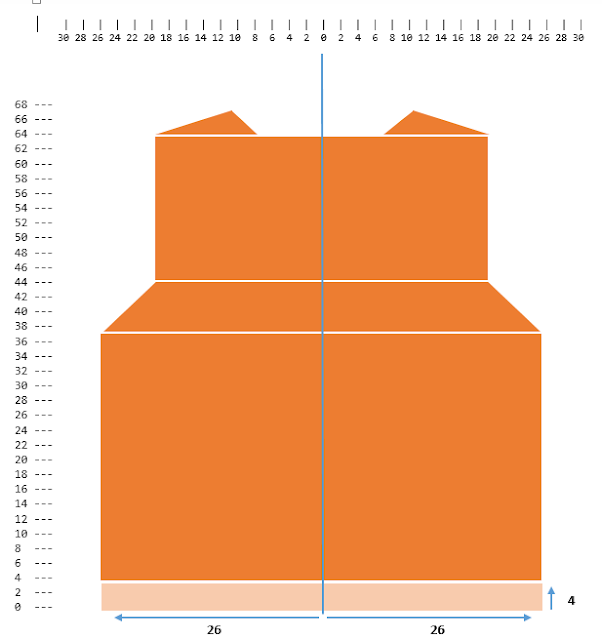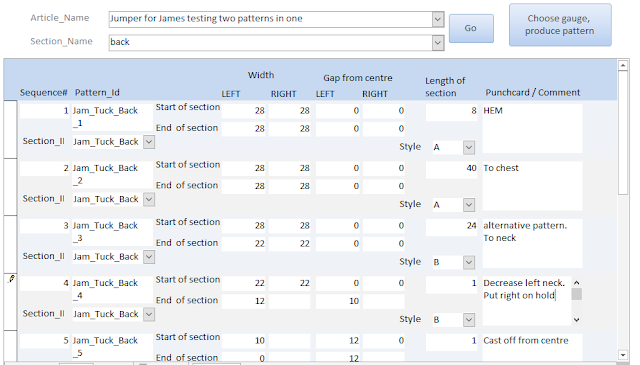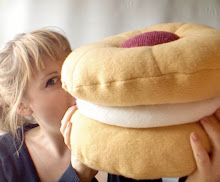A hedgehog in a trophy
Sorry, No Win, Try Again Later
Sarah Kerry's blog. That's right. Me!
Monday, 25 April 2016
Saturday, 23 April 2016
Tracing garments for machine knitting
 |
| Quick snap of a commission before relinquishing it |
Sometimes, I get asked how I make my own jumpers and cardigans (etc), using my knitting machine. I have a couple of different ways of coming up with my knitting patterns, but mostly I try to make my pieces fully finished, that is, that they do not need to be cut after knitting in order to put together.. Here I will explain how I trace a pattern from an existing garment. I have simplified the process, but you should be able to get the idea.
Lay the piece out as flat as possible. This is a back piece with a hem at the bottom.
Now, separate out the sections. The idea is that in each section, the change in width should be constant.
Although the width is different at the start and the end of the middle section, you should be able to calculate the decrease from the height and the starting and finishing width
Measure the starting width from the centre (on the knitting machine, the centre position is marked as 0). For asymmetric pieces this may be different on each side. Measure the height of this section. Remember to add on seam allowance. As a rule, I add about 1cm, generally I sew the item up before washing and blocking, so you should have more than 1 cm before washing, unless the shrinkage rate of the yarn is 0.
Note here that the starting width differs from the finishing width. When reading the pattern in rows and stitches rather than cm or inches, you can work out the rate to decrease/ increase by.
In this last section, the left and right parts will have to be knit separately. Note that piece starts 8 cm away from the centre, and finishes 10 cm away from the centre. That means you will want to decrease from both sides at different rates. You will also have to make a section of height 0 before it to bind off/ ignore the stitches from the centre.
My input form looks like this:
Note the addition of "style" and "comment". I introduced the "Style" option so that I could introduce an element of pattern into a garment, and account for the gauge. For example, knitting two stranded fairisle will give a tighter gauge for the same tension than knitting plain stockinette, and knitting a tuck stitch pattern (intended style B in this pattern) tends to give a much wider, squatter knit for the same tension. In practice I play about with the tensions so that I'm not adding or decreasing a lot of stitches in between styles.
Once this is completed for all the parts of the item of clothing you want to copy, you have an algorithm that can be used to create your
I compiled a gauge table, where I have knit up my frequently used yarns with different tensions and stitches, and measured the row/ st per cm. I use a query to apply my chosen yarn and stitch to each section.
When I want to pull out a pattern, I go to the above form and select the pattern, then for as many styles as are in the pattern, I select the yarn, stitch and tension. I can compare the gauges before drawing up the pattern.
Now you have a pattern to apply to your knitting machine. In sequence 3, the command is to decrease every 11.8 rows. This is just a guide so you can get from the 81 to 64 width in 207. You might end up decreasing by 3 every 35 rows, I like those bunched decreases.
I imagine there is some software out there* that can do this for you, but I find this way fairly easy to work with. I've played about with the GUI (hoho, bit of a grand name for what I have made) to make it easier to read and understand, after I made a tunic by accident instead of a jumper when I misread an old pattern. Whoops!
This blog has been quite dry, so here are some disguises for eggs I drew in case you need to disguise some eggs
*definitely there is
Friday, 22 April 2016
Dino apron & Soft Spot
 |
| Apron in use |
 |
| Apron, with obligatory loo roll |
Here's an apron I made for my dinosaur and baking/craft mad nephew. I used fabric I picked up in the Nippori Fabric district in Tokyo. I can't find a good picture of the fabric on my phone or online, but if I get one I'll add it. I used a pattern from the John Lewis website. I didn't bother with the pocket (what does he need a pocket for).
Over Easter, we discovered the fantastic work of Philippa Rice and Luke Pearson via their "Soft Spot" videos. Visually, I'd say they have an element of 1970's children's television to them and they feature some rather exquisite stop motion animation. You can check them out and sponsor them to make more videos, if you like. The most recent video is a real treat, me and husband-to-be laughed a lot.
Below is a little video the nephew and I made after watching some videos. For the sea, stuck strips of paper to the stick side of an adhesive sheet of A4 paper, unpeeling the sticky side inch by inch. The nephew drew the boat on an adhesive sheet of paper and stuck it to a piece of felt, and I cut that out for him. He would like you to know that the red in the background is lava. This was the first time he has had a go at stop motion, hopefully in the future we can spend more time on a longer one
Thursday, 21 April 2016
Long time...
Well, hello there. It is quite dull hearing a person who frankly was never a regular blogger, witter on about why they have not posted. Much has happened. The key thing to know is I'm not making and selling any more. I may talk about it another time, but I was not making a living and my mental health was suffering.
I have not had as much time for knitting lately, but I've been quite into repairing clothing.
In the seaweed green cardigan below, you can see that the cuff on the top sleeve is threadbare and frayed, and the elbow is worn out.
I have not had as much time for knitting lately, but I've been quite into repairing clothing.
In the seaweed green cardigan below, you can see that the cuff on the top sleeve is threadbare and frayed, and the elbow is worn out.
I cut the cuffs off, and threaded the stitches onto the thinnest needles I had, knitting two together with thicker yarn. Then I knitted it up on the round with a corrugated contrasting colour rib.
You could describe the method used on the elbows as embroidery, something akin to chain stitch but more knit-like.
For less haphazard approach, check out Tom of Holland's visible mending blog and Amy Twigger Holroyd's stitch hacking.
I also knit this jumper for my Dad, back in 2011. I traced the pattern from a jumper of his (edit- I wrote a post on how to trace existing garments), and I wrote a database to handle converting into different gauges. He was really supportive while I was making and selling, driving me to markets and sometimes manning the stalls. He was keen to model the VW commission (did I even blog about that?). He loved this jumper, and when he got ill and the neck hole was too narrow, I made him another jumper with more of a boat neck. I have both jumpers back now Dad is gone.
I do think there is something emotive about making clothes for someone, knitting for someone. Perhaps it is a way of silently ensuring another person is warm, and knows they are cared for. Maybe it is simply a hobby. Probably a bit of both
Monday, 17 October 2011
If the apocalypse has this much fairisle and cabling, I'll be pretty happy
Morning All- has anyone been watching "The Fades". It's a rather well crafted offering from BBC3 (yeah, BBC3! They made something good - sometimes it happens). Anyway, if the interesting idea of our post death journey getting mixed up and ruining the world isn't enough to tempt you, perhaps the knitwear is? There's a visual feast every episode.
Plus its got him off of Psychoville on it, playing a scifi mad geek sidekick. I do find the "geek turned hero" theme irksome, because often it presents "geeks" as a people with humorous idiosyncracies, but an unrealistic off-the-scale eloquence and sharp wit (Seth Cohen from the OC I'm ruddy looking at you). Or they just wear glasses. There's so much goodwill between the two characters that you can let that go.Besides, they have awesome knitwear. and no glasses
Monday, 27 June 2011
The appliance of science, yadda yadda
I spent the weekend at the Science Museum, helping out the stitch london lot. I taught plenty of children and a fair few adults how to make a pom pom (If you want to know, google it, or go here)
and thusly, this A&G (Adam and Garth) clip was never far from my brain
There were some amazing things to see and do, and I couldn't possibly do them all justice, so head over to Lauren's stitch london tumblr to see them all in their glory.
One thing I really enjoyed was (re)learning to cross stitch -in my roughshod freestyle way - with Mr X Stitch, who lives at http://www.mrxstitch.com/ and his minions (they'll love that, they will). If you haven't cross stitched for years, give it a go! This years Christmas is going to be full of contemporary subversive samplers. More so than last year. Here is my offering
Thursday, 23 June 2011
To Infinknitty and Beyond
And that's the last time I use that pun ever.
This weekend, see my giant plug and socket alongside plenty of science based stitched specimens and the Science Museum, nr South Kensington tube station,in central london. Also there will be a HUGE knitted solar system, and guess what? I only went and knit Uranus, and we all know uranus is a hilarious homophone. Also one of Claire Platt's super cool aeroplanes will be there.
Click here for all the info
This weekend, see my giant plug and socket alongside plenty of science based stitched specimens and the Science Museum, nr South Kensington tube station,in central london. Also there will be a HUGE knitted solar system, and guess what? I only went and knit Uranus, and we all know uranus is a hilarious homophone. Also one of Claire Platt's super cool aeroplanes will be there.
| This heart by Sayraphim Lothian got lost in the post winging its way from Australia. Seemed a shame so I thought I'd give it an extra mention |
Subscribe to:
Posts (Atom)














